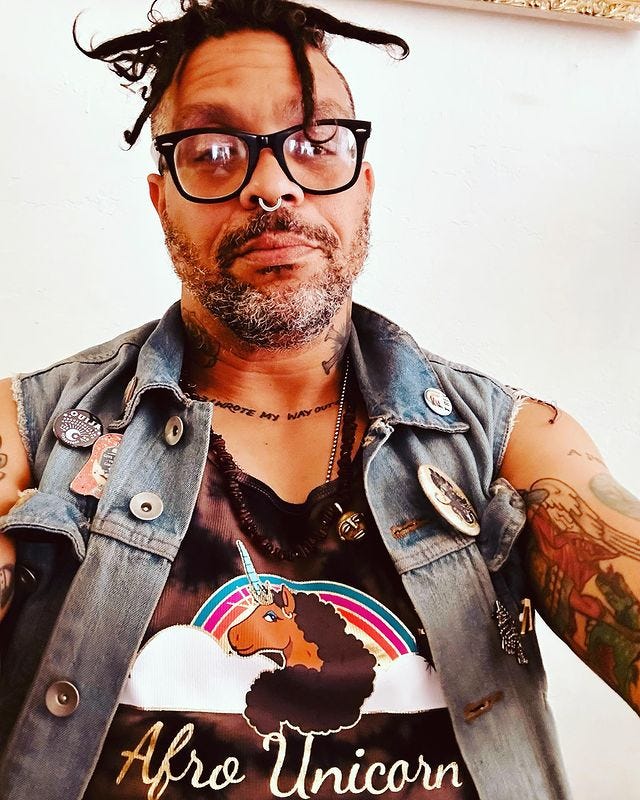Hip-Hop and the Holy Spirit
On Lenny Duncan's Psalms of My People: A Story of Black Liberation As Told through Hip-Hop
In their newest book Psalms of My People: A Story of Black Liberation as Told through Hip-Hop, writer and scholar Lenny Duncan claims that “hip-hop has a theology, an epistemology, and a cosmology.” The book attempts to not only articulate hip-hop’s spiritual importance, but become a part of it — an "attempt to create a Black sacred cultural artifact."
It is, I believe, a part of the author’s process to decolonize their own faith.
We’re getting Psalms of My People not quite a year after Duncan published Dear Revolutionaries: A Field Guide for a World beyond the Church which was the result of the former minister’s own reckoning about how the church had failed its communities during the pandemic and Trump’s presidency.
In Duncan’s personal life beyond the church, they realigned their spiritual focus to Yoruba: a Nigerian religious tradition that’s part of the heritage of many African Americans. In Dear Revolutionaries, they explain:
With Ifá [a divination practice found in Yoruba] and other African diaspora practices and inheritances, I am trying to synchronize, quite openly, the message of the Liberating Christ I encountered in the Gospels, and earth-based practices that connect me to the Divine in ways that I believe are truly emancipatory.
Duncan’s newest book continues this work. Through a hybrid of poetry, prayer, and prose, Psalms of My People acts as a bridge between American culture, its politics and majority religion, and the indigenous traditions of many African Americans.
For instance, about Jay-Z and Kanye West’s “Made in America,” they write:
Look this song for me is like if you could go back
to the moment
the levees broke during Katrina, or see
the moment the Tower of Babel slowly rocked
back and forth, or
when African leaders
in the early eighteenth century realized
how fucked they were.
That’s this moment in hip-hop.The poetry that follows is my attempt
to understand the Tower card from the Tarot.
To understand the Leviathan. To understand a
mass shooter seconds before they strike. This is
the madness that infects us all.
It makes me wonder why evil things happen to
good art.
In this hybrid form, Duncan takes us through a history of hip-hop, from N.W.A.’s “Fuck tha Police” to Common’s “A Song for Assata.” They use personal accounts of where they were when certain songs or albums dropped. For instance, they first heard Miseducation from a prison cell in Montgomery. And they contextualize the music with what was going on in the country at the time and connect it to the injustices that are still occurring.
They connect the assassination of 2Pac to the assassination of Malcom X and Fred Hampton and the murder of George Floyd — the ongoing lack of changes in the country. They offer commentary on what happened to Kanye: “Kanye West is what happens to the Black artist under the white gaze.”
As part of that synchronizing work, Duncan uses hip-hop to create their own poetry and prayers to Black gods and orishas. Riffing off of 2Pac’s “Thugs Mansion,” which contains the line, “Dear Mama don’t cry,” Duncan writes, “Dear Divine Mama who has the title | Tilly, Afeni, Samira, and Osun.” Whether there are nods to these traditions originally found in the music or not, Duncan invokes a connection.
Duncan warns readers unapologetically that the book is going to be a challenging read. It will “flow wildly among first person, antagonist, and third person” and weave in facts, autobiography, and “some theological premise that comes out of absolutely nowhere.”
I did find it a challenging read, but in a way, it felt fitting for a book about hip-hop as “the Holy Spirit at work—for a people, for salvation.”
Since its inception, hip-hop has challenged the country’s notions of what music should be allowed on the radio, what messages our kids should absorb, what truth people are allowed to share and how angry they’re allowed to be when they do it. And sometimes, one of the best signs of an artwork’s divine inspiration is how uncomfortable it makes you feel.
Artwork from oppressed communities has always made others around them uncomfortable. That’s sort of the point.
“Truly, I hope I have transgressed your purity, taken away your sense of safety, and added warts to the face of not just the church but also this wicked land,” Duncan writes.
Claiming hip-hop has divine inspiration does not mean it’s flawless, and Duncan doesn’t attempt to gloss over the genre’s issues. They admit that hip-hop is “also queerphobic, lost, and, at times, its own worst enemy.” But in a beautiful turn, Duncan asks the reader who’s accustomed to criticizing hip-hop to criticize them instead:
“I want to handle it the same way I wish I was, with the tenderness that every Black child deserves, every Black woman, man, queer, gender expansive, and theybie wonder like me. I want to handle it in a way that I hope puts me, my body, and my psyche on the line and not the people.”
I believe Duncan is really asking, can you approach this topic with compassion? Or maybe this: can you sense the Divine at work in an unjust world?
Featured image by XOffset
Thanks for reading Radical Soul! Subscribe for free to receive new posts.
This newsletter is free for everyone. Want to support? Buy me a coffee via Venmo or PayPal.





